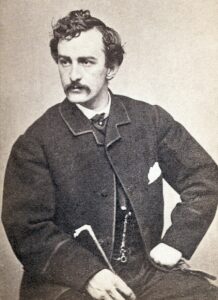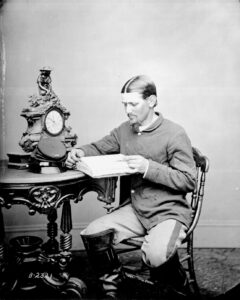By Sharon Oliver
Contributing Writer
BOSTON – Lincoln assassin John Wilkes Booth has made headlines again as the subject of the Apple TV+ seven-episode conspiracy thriller “Manhunt.” Based on James L. Swanson’s book “Manhunt: The 12-Day Chase for Lincoln’s Killer,” the docuseries follows the journey of Lincoln’s Secretary of War, Edwin Stanton, in his pursuit to learn the full extent of the conspiracy that led to the president’s assassination—a conspiracy and various origins that could be traced back to Boston.
Plot hatched Parker House Hotel
Born in 1838, John Wilkes Booth was an actor like his father Junius Brutus Booth. By age 16, he showed interest in theater and politics, particularly for the Know Nothing party. Booth also displayed great anger at Lincoln’s re-election. An advocate of slavery, he was obsessed with the South’s worsening condition in the Civil War. In 1862, he made his Boston debut playing nightly at the Boston Museum and the Boston Transcript once wrote a review calling him “the most promising young actor on the American stage.” However, it was his brother Edwin, a Boston resident at the time, who was the titan of Shakespearean stage plays and did share his political views.

On July 26, 1864, Booth reportedly met with fellow conspirators and Confederate sympathizers at the Parker House Hotel to plot a plan to kidnap and kill President Lincoln, along with Secretary of State William Seward. The plan fell through, but Booth remained in the city for a few more days. Booth owned property on Commonwealth Avenue but never built a house on the lot.
Booth returned to Boston on April 5, 1865, where he was seen at a firing range, presumably Roland Edward’s Pistol Gallery on Green Street, practicing shooting his pistol just 10 days before assassinating Lincoln. On April 17, 1865, Edwin Booth was released and allowed to return to New York City after being detained by federal marshals following Lincoln’s assassination.
Killed by Union soldier
The man credited for bringing down John Wilkes Booth, as he crouched inside a barn, is Sergeant Thomas “Boston” Corbett, a/k/a The Mad Hatter. Corbett defied orders to capture Booth alive. The English-born soldier who hailed from Boston was known for his religious beliefs and eccentric behavior. After being discharged from the army in 1865, Corbett returned to Boston to work as a milliner. When the hat-making business started to slow, Corbett had difficulty holding down a job and his erratic behavior increased. A fervent Christian, Corbett made himself a eunuch and did not check himself into a hospital until he had said his prayers, finished dinner, and took a light stroll through the city.

Nevertheless, his fame as “Lincoln’s Avenger” earned him the appointment of assistant doorkeeper of the Kansas House of Representatives in 1887. Unfortunately, Corbett became convinced that House members were discriminating against him, and at one point, he brandished a pistol and chased the officers out of the building. The next day, a judge declared Corbett insane and sent him to the Topeka Asylum for the Insane. Thomas “Boston” Corbett later escaped from the asylum by horseback. Although there were repeated claims by men stating they were Corbett, their stories were discredited and by all accounts, the man who killed John Wilkes Booth disappeared in 1888.
John Wilkes and his brother Edwin never saw eye to eye when it came to politics or President Lincoln. The assassination was a blow from which Edwin never fully recovered even though Boston citizens were sympathetic to his burden. The infamy associated with the Booth name caused him to abandon the stage until January 1866, when he reappeared to play the role of Hamlet. Edwin forbade the name of his brother to ever be spoken in his house again.
RELATED CONTENT:
Worcester author chronicles one of Revolutionary War America’s most notorious crimes
Medford woman was victim of the ‘Black Dahlia’ unsolved murder
Sacco and Vanzetti case continues to resonate nearly a century later












